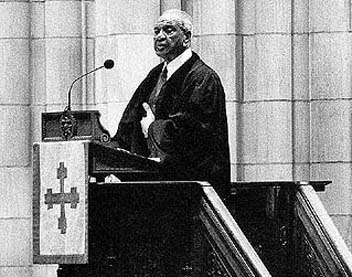|
The Rev. Gardner C. Taylor was 96 and in retirement in North Carolina. Once he was a giant in the pulpit of Brooklyn, the entire world. He was an intellectual who made bells ring when he spoke.
I was just thinking about Dr. Taylor Sunday afternoon as I pondered the closeness of Passover and Easter this year, remembering seders at the Kelman household on West End Avenue and the sermon by Dr. Taylor in Harlem during Holy Week. How lucky to be part of so many worlds. To my chagrin, I had never heard of Dr. Taylor until 1978, when I was covering religion for the Times, although he was a pillar of religion and civil rights (if one can separate them) as pastor at the Concord Baptist Church of Christ in Bedford-Stuyvesant. I heard about a gathering of black pastors every Monday, when one preached and later they all went out for lunch, uptown. It was the day after Palm Sunday, and Dr. Taylor was preaching to the committed, about the ordeal of Jesus Christ during Holy Week. For a time, he was intellectual, measured, logical, but then he raised the amps. I described the mood in the church: “I say to every Christian, You have not even wrestled with temptation the way Jesus did. Where are the blood marks? What pain have you undertaken in the name of Jesus? What sacrifice...? We cannot even know the misery of our Lord.” Then, with most people leaning forward eagerly, Mr. Taylor retold a basic truth of Christianity – that Jesus came back on Easter morning. “He won!” Mr. Taylor exclaimed, and his own colleagues began chanting at the end of every sentence. “He won!” until he finished with the urgent, emotional message of the Resurrection, and ended abruptly. I can still hear his voice pealing. Later I came to know how he and the Rev. Martin Luther King had formed a progressive black Baptist denomination to advance civil rights, and in 1993 Dr. Taylor preached during the inauguration of President Clinton. I grieved from afar in 1995 when Dr. Taylor’s wife, Laura Scott Taylor, the unsalaried principal of the church elementary school, was killed by a truck as she crossed a street in Crown Heights. (He later remarried.) He was a great American, graduate of the School of Theology, Oberlin College , and lecturer at Princeton. He was on my mind the afternoon he passed.
Josh Rubin
4/10/2015 03:57:20 pm
I just wanted to comment that I really appreciate your obituary for Reverend Taylor. When I reached the end and saw that he is a graduate of Oberlin, I thought "of course." Oberlin has a very distinguished civil rights history dating back to its being the first college to admit blacks alongside whites (1833) to admit women alongside men (1835), was a stop on the underground railroad and played an outsized role in the civil rights movement among other movements. Oberlin helped rescue Pete Seeger from the blacklist - he played there repeatedly in the 50s, launching him onto the college circuit that sustained him when blacklisters tried to break him. It is a unique and proud heritage.
George Vecsey
4/11/2015 01:19:21 am
Josh, thanks for noticing. The obit and the earlier feature by Sam Freedman indicate how hard it was for the young Gardner Taylor to reach Oberlin from Louisiana. You are right about Oberlin -- when I covered Appalachia in the early 70's, a lot of Oberlin students were working/volunteering in anti-poverty programs, voter outreach programs, even the first wave of the ecology movement. The movements overlapped -- two NY rabbis, Abraham Joshua Heschel and my friend Wolfe Kelman, marched at Selma, and my friend and Louisville neighbor, Rabbi Martin Perley, was a beacon for civil rights in that city. Righteousness comes in many forms. GV
Joel
4/18/2015 05:22:18 pm
I saw your blog entry following a google search regarding Rev. Taylor's passing. I spoke with him bi-monthly for over a year before he entered convalescence. Visiting with him in Raleigh on my b-day is one of my greatest memories. I live in BK. I have audio copies of his sermons if you're interested. Comments are closed.
|
Categories
All
|










